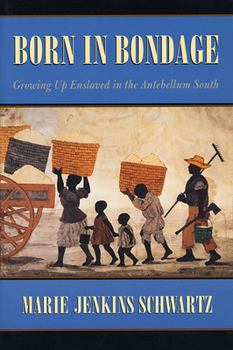Born in Bondage: Growing Up Enslaved in the Antebellum South
Select Format
Select Condition 
Book Overview
Each time a child was born in bondage, the system of slavery began anew. Although raised by their parents or by surrogates in the slave community, children were ultimately subject to the rule of their owners. Following the life cycle of a child from birth through youth to young adulthood, Marie Jenkins Schwartz explores the daunting world of slave children, a world governed by the dual authority of parent and owner, each with conflicting agendas...
Format:Paperback
Language:English
ISBN:0674007204
ISBN13:9780674007208
Release Date:September 2001
Publisher:Harvard University Press
Length:288 Pages
Weight:1.00 lbs.
Dimensions:0.6" x 6.1" x 9.2"
Customer Reviews
2 ratings
Economics drove slavery - including family life
Published by Thriftbooks.com User , 17 years ago
In this intriguing study, Marie Jenkins Schwartz has given us a better understanding of how the economics of slavery drove family life in the Amtebellum South. It comes as no suprise that economics was the key factor in the perpetuation of slavery prior to the American Civil War, but this study gives the reader a new appreciation for how slaveholders viewed slaves, including children, as nothing more than property. Schwartz delves into many facets of slave family life, including pregnancy, birth of a child, education of the child, the horror of sale and separation from family members, and love and marriage in the slave community. Her work is well documented and is a fascinating look at this topic. She explains how the slaveholders attempted to exert paternalistic control over the families for personal economic gain. For example, in the section on love and marriage, the author explains in great detail how slaeholders often made a mockery of the ceremony by forcing the omission of the standard "'till death do us part" or "what God hath brought together let no man put asunder". She explains that these concepts were left out by the slaveholders to ensure no feelings of guilt or remorse when the newly married couple was broken apart by sale of one partner or the other. Her study seems to be largely focused on using the documents from the slave narratives collected during the Great Depression during the WPA, but well supplemented with contemporary accounts, including journals, diaries, and plantation records. When combined with quality secondary sources, the author has painted a nice portrait of slave family life. The area of slave family life is one that has been largely ignored by scholars in the past, and this book is a valuable contribution to the existing scholarly literature on the topic. I would highly recommend anyone interested in family dynamics and relationships between slaveholder and slaves in the Antebellum South read this book.
a thought-provoking study of childhood under slavery
Published by Thriftbooks.com User , 22 years ago
This absorbing book both confirms established information (e.g., the prevalence of children among domestic workers) and challenges popular assumptions about slaves' lives (Schwartz suggests that antebellum planter families frequently ignored injunctions against teaching slaves to read and that many, perhaps most, slave children learned the alphabet and basic reading skills, even if few became competent readers). Schwartz draws on WPA narratives of former slaves, as well as the memoirs of former slaves and slaveowners, to construct a surprising vivid picture of young children's lives under slavery. Her writing is smooth and clear, though occasionally repetitive.






